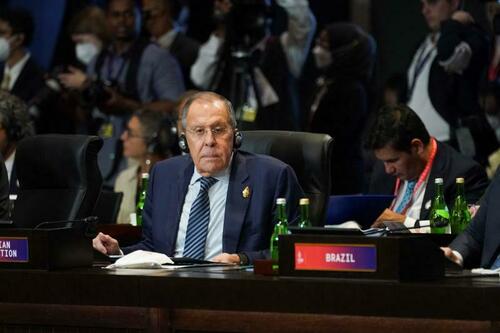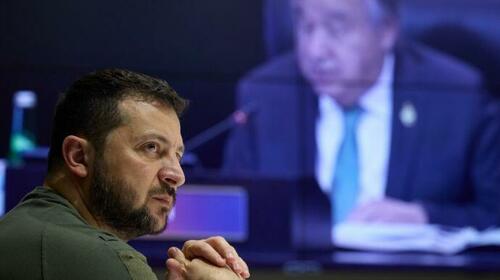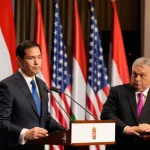
Russian Foreign Minister Sergei Lavrov was quick to reject what he called "unrealistic and inadequate" terms for future peace talks put forward by Ukrainian President Volodymyr Zelensky on Tuesday.
Zelensky had addressed the G20 summit in Bali via video link earlier in the day, in which he presented a 10-point peace plan to end the war. Key features of the plan include withdrawal of all Russian troops from Ukrainian territory, the assurance of nuclear safety, food security including the ability to freely export, and an "all for all" prisoner swap.
FM Lavrov, who is representing Russa in Bali in President Putin's stead, was in attendance for Zelensky's video address, reportedly having remained in his seat for the duration. Lavrov later confirmed to reporters that he listened to the whole thing, which marks at least a "start" in terms of the potential for a future negotiated settlement.

Lavrov responded to the peace terms, saying "I reminded him [Macron] that all the problems are on the Ukrainian side, which categorically refuses any negotiations and puts forward terms that are obviously unrealistic and inadequate," as quoted in AFP. Addressing accusations that it is Moscow that remains unwilling to enter talks, Lavrov said, "If anyone is refusing, it is Ukraine. The longer it refuses, the more difficult it will be to reach an agreement."
The Kremlin has also previously pointed the finger at the US and UK for at every turn pushing Kiev away from meaningful ceasefire talks.
Below is the "10-point peace plan" which was presented by Zelensky before the G20 on Tuesday:
- Radiation and nuclear safety
- Food security
- Energy security
- Release of prisoners and deportees
- Implementation of the UN Charter
- Withdrawal of Russian troops and cessation of hostilities
- Justice
- Ecocide and the protection of the environment
- Prevention of escalation
- Confirmation of the end of the war
Despite talking "peace" - Zelensky throughout the speech took repeat swipes at Russia, for example mocking Putin's absence at Bali by calling it the "G19 summit".

Zelensky further charged that Moscow has continued making nuclear threats and that its forces have turned the Zaporizhzhia Nuclear Power Plant into "a radioactive bomb that can explode at any moment."
Despite each side remaining further entrenched in their corners and unwilling to compromise, and at a moment Ukraine has maintained the momentum of its counteroffensive by taking Kherson, Zelensky's 10-point plan does at least represent an opening of sorts, given just a couple months ago there wasn't so much as discussion or possibility of a "peace plan".
Crucially, noticeably absent from Zelensky's peace plan was his prior demands of accelerated entry to NATO...
NEW: #Zelensky just issued a "10 point plan for peace" at the #G20 but said there will be no "Minsk 3" to end the violence.
— Responsible Statecraft (@RStatecraft) November 15, 2022
What wasn't mentioned? #NATO.
NEW Ted Snider: https://t.co/jjONhLDs5h
Currently, the idea of a diplomatic solution is also being debated in Washington, so this perhaps represents an inching forward on the possibility of future negotiated settlement.
Responsible Statecraft observes of Zelensky's speech, "A possible diplomatic shift in the war in Ukraine may have gone largely unnoticed when Kiev appeared to signal that it might be willing to give up its aspiration to become a member of NATO. Or at least downgrading its urgency."
Russian Foreign Minister Sergei Lavrov was quick to reject what he called “unrealistic and inadequate” terms for future peace talks put forward by Ukrainian President Volodymyr Zelensky on Tuesday.
Zelensky had addressed the G20 summit in Bali via video link earlier in the day, in which he presented a 10-point peace plan to end the war. Key features of the plan include withdrawal of all Russian troops from Ukrainian territory, the assurance of nuclear safety, food security including the ability to freely export, and an “all for all” prisoner swap.
FM Lavrov, who is representing Russa in Bali in President Putin’s stead, was in attendance for Zelensky’s video address, reportedly having remained in his seat for the duration. Lavrov later confirmed to reporters that he listened to the whole thing, which marks at least a “start” in terms of the potential for a future negotiated settlement.

Lavrov responded to the peace terms, saying “I reminded him [Macron] that all the problems are on the Ukrainian side, which categorically refuses any negotiations and puts forward terms that are obviously unrealistic and inadequate,” as quoted in AFP. Addressing accusations that it is Moscow that remains unwilling to enter talks, Lavrov said, “If anyone is refusing, it is Ukraine. The longer it refuses, the more difficult it will be to reach an agreement.”
The Kremlin has also previously pointed the finger at the US and UK for at every turn pushing Kiev away from meaningful ceasefire talks.
Below is the “10-point peace plan” which was presented by Zelensky before the G20 on Tuesday:
- Radiation and nuclear safety
- Food security
- Energy security
- Release of prisoners and deportees
- Implementation of the UN Charter
- Withdrawal of Russian troops and cessation of hostilities
- Justice
- Ecocide and the protection of the environment
- Prevention of escalation
- Confirmation of the end of the war
Despite talking “peace” – Zelensky throughout the speech took repeat swipes at Russia, for example mocking Putin’s absence at Bali by calling it the “G19 summit”.

Zelensky further charged that Moscow has continued making nuclear threats and that its forces have turned the Zaporizhzhia Nuclear Power Plant into “a radioactive bomb that can explode at any moment.”
Despite each side remaining further entrenched in their corners and unwilling to compromise, and at a moment Ukraine has maintained the momentum of its counteroffensive by taking Kherson, Zelensky’s 10-point plan does at least represent an opening of sorts, given just a couple months ago there wasn’t so much as discussion or possibility of a “peace plan”.
Crucially, noticeably absent from Zelensky’s peace plan was his prior demands of accelerated entry to NATO…
NEW: #Zelensky just issued a “10 point plan for peace” at the #G20 but said there will be no “Minsk 3” to end the violence.
What wasn’t mentioned? #NATO.
NEW Ted Snider: https://t.co/jjONhLDs5h
— Responsible Statecraft (@RStatecraft) November 15, 2022
Currently, the idea of a diplomatic solution is also being debated in Washington, so this perhaps represents an inching forward on the possibility of future negotiated settlement.
Responsible Statecraft observes of Zelensky’s speech, “A possible diplomatic shift in the war in Ukraine may have gone largely unnoticed when Kiev appeared to signal that it might be willing to give up its aspiration to become a member of NATO. Or at least downgrading its urgency.”







